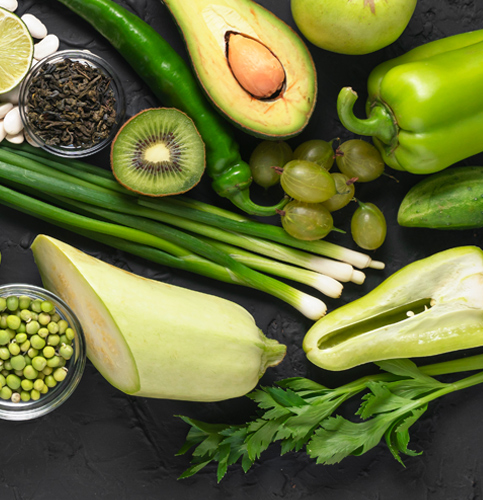What are micronutrients
Nutrition is more complex than simply having enough to eat. It is a critical part of staying healthy at all life stages 1. Nutrients can be divided into macro and micronutrients. They provide energy, the building blocks for protein to grow and maintain muscle mass and maintain normal bones, and are essential for controlling all the chemical processes that take place in our bodies 2. Making sure that our intake of macronutrients or micronutrients is optimal through good dietary choices is a great start to look after your health and well-being.
Jump to:
Macronutrients are required by the human body in large quantities (macro means large) and are used for energy production as well as for growth and maintenance, transport and making more complex molecules. They make up the bulk of our food and it is not hard to get enough of them. There are only three types of macronutrient; they are proteins, carbohydrates and fats 3 although fibre is often also included.
In contrast, micronutrients (sometimes called vitamins and minerals) are required in very small amounts but benefit the body in very important ways. Because they make up such a small fraction of what we eat, and because there are 27 different types, it can be hard to make sure that we get enough of them. Apart from vitamin D, they cannot be made by the body and must be derived from our diet 4.
What are micronutrients?
The World Health Organisation micronutrients definition is:
“vitamins and minerals needed by the body in very small amounts”
It is also stressed that the benefit of micronutrients on the body is critical as they perform a range of functions, including enabling the body to produce enzymes, hormones and other substances needed for normal growth and development 5.
Both macro and micronutrients are essential but with micronutrients but as the name suggests, tiny quantities play a vital role in maintaining a healthy body. Vitamins and minerals are classified as micronutrients and common micronutrients examples include vitamin C and iron.
What are the functions of micronutrients?
Micronutrients are used for a huge range of different functions and the full extent of their role is still being discovered. They are used in all the vital processes that the body carries out. For example, magnesium is used for electrolyte balance, energy-yielding metabolism and many other functions 6.
The proven functions of some of the main micronutrients are detailed in the tables below 6.
What are the different types of micronutrients?
Micronutrients can be classified as water-soluble vitamins, fat-soluble vitamins, microminerals and trace minerals. There are Nutrient Reference Values given for 13 vitamins and 14 minerals and these are used for food labelling. They are EU guidance levels on the daily amount of vitamin or mineral that the average healthy person needs. This is based on detailed reviews of the research and are applied to all products for adults 7. The values are given here together with the foods that contain them.

Water-soluble vitamins – functions and sources
These vitamins can be dissolved in water which means that any excess is flushed out of the body and they need to be replenished through the diet daily.
* it is recommended that women trying to become pregnant or who are pregnant take a 400µg folic acid supplement daily until the 12th week of pregnancy.
Fat-soluble vitamins - functions and sources
Fat-soluble vitamins are absorbed through the gut with the help of fat. They can be stored in the liver and fatty tissue until the body needs them.
Microminerals - functions and sources
These are minerals that the body requires in larger amounts, these are sometimes called macrominerals. 12
We need 100s or 1,000s of milligrams (mg) every day to carry out specific roles.

Trace minerals - functions and sources
Trace minerals are required in extremely small amounts but are crucial for essential life processes. Our bodies need just tens of milligrams or even just micrograms every day.
Some micronutrients are considered to be antioxidants due to one of their roles being to protect cells from oxidative stress. These micronutrients are vitamins C and E, Riboflavin, Selenium, Zinc, Copper and Manganese 9, 10 There are further micronutrients such as chromium, and molybdenum that play an important role in the body.
Why take micronutrient supplements?
It is not always easy to calculate micronutrients in food items accurately to be sure we are getting adequate amounts in our diet. Making sure our body has enough of these essential nutrients is vital to ensure it is working at its best. Some groups of people need more of certain nutrients than others, for example, women trying to get pregnant or who are pregnant are advised to take 400µg Folic Acid supplement.
You can have confidence that your body is well-fuelled by eating a balanced diet that includes five portions of fruit and vegetables, high fibre starchy foods, dairy (or dairy alternative), protein from meat, beans, pulses, fish or eggs and unsaturated oils 13.
However, our nutritional needs are constantly changing due to ageing, diet changes and exercise changes and our demanding lifestyles mean that it can be difficult to maintain the correct micronutrients daily intake. A micronutrient supplementation program is a safe and convenient way to top up our intake of these essential nutrients.
Take away message for micronutrients
Micronutrients are substances that are needed in very small quantities by the body and are sometimes referred to as vitamins and minerals. They fulfil a vital role which enables the proper function of our bodies. They are present in a wide range of foods and you can also get them from supplements. However, micronutrient supplements should not be used as a replacement for a balanced diet. Before beginning supplementation, speak to a health care professional.
References:
https://www.nutrition.org.uk/healthyliving/basics/exploring-nutrients.html?start=1
http://www.emro.who.int/health-topics/macronutrients/index.html
https://www.cdc.gov/nutrition/micronutrient-malnutrition/micronutrients/index.html
https://ec.europa.eu/food/safety/labelling_nutrition/claims/register/public/?event=search
https://eur-lex.europa.eu/legal-content/EN/TXT/HTML/?uri=CELEX:32011R1169&from=EN

